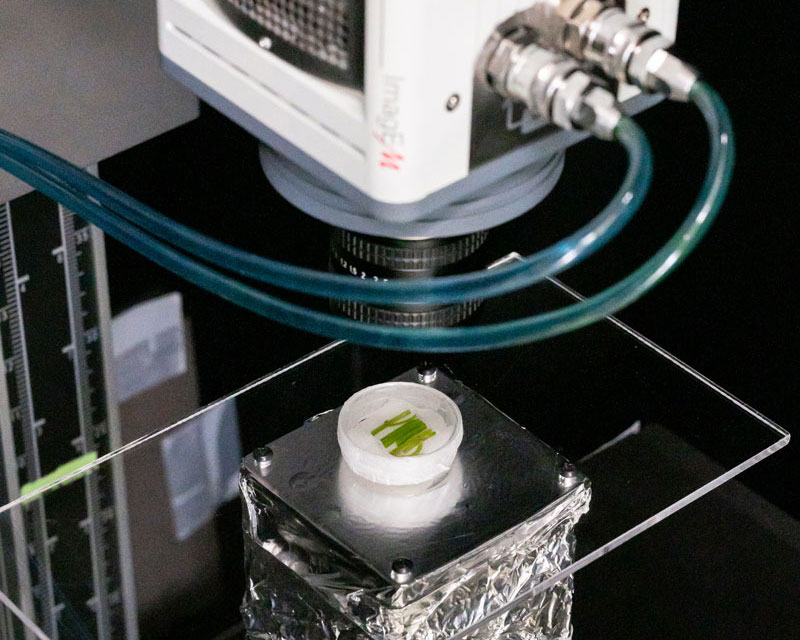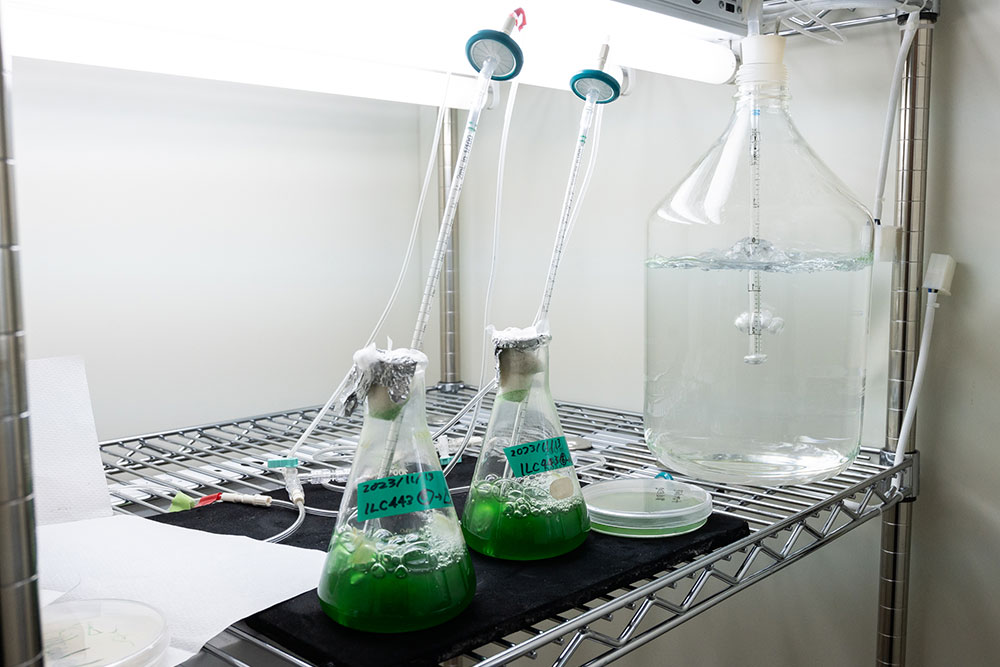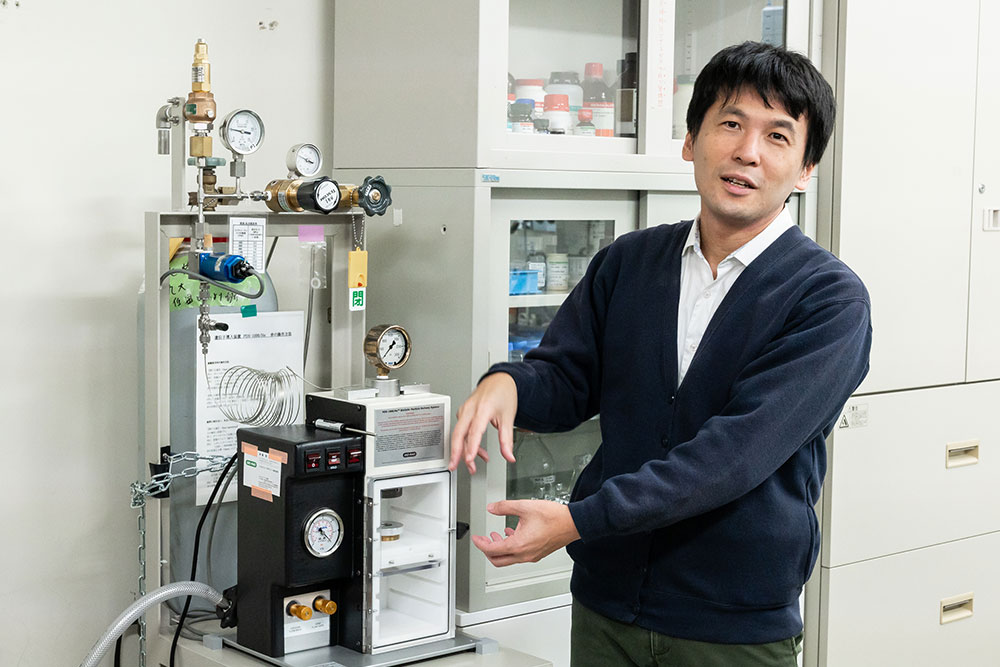From robots to living things: A multidisciplinary biologist strives to uncover the mysteries of the biological clock
Discover the Research: Article 2 – Hiroshi Ito, Faculty of Design

We've all had the experience of staying up late and not being able to wake up the next morning. This difficulty arises due to a shift in what's known as our biological clock, which is the central theme of Associate Professor Hiroshi Ito's research at Kyushu University's Faculty of Design. We spoke with Ito to explore the advantages of cross-disciplinary studies and to discover how he uses his expertise in robotics, artificial intelligence (AI), and engineering to understand the true nature of the biological clock.
The original Japanese version of the interview can be found here.
Investigating the true nature of the biological clock
Could you tell us about your current research?
I am researching the biological clock, which I'm sure everyone has heard about at some point. It’s used in expressions like "my biological clock is out of whack," to explain trouble getting up in the morning. But we can't actually see the biological clock. We don’t know anything about its size, its location, its color, or even its shape.
That's true, no one ever really thinks about it.

Scientists have long struggled to figure out what exactly the biological clock is. Even Charles Darwin, well-known for his theory of evolution, explored the biological clock in his later years. Darwin's theory of evolution was based on extensive observations of various life forms, yet it weighed on him that he could not understand the underlying mechanism of genetics.
Inspired by an interest in hereditary material, Darwin believed in a biological clock that passed through generations and conducted many experiments to explore this concept. During the 19th century, Darwin and his contemporaries brought the existence and nature of the biological clock into the spotlight of scientific discourse.
Does the term "biological clock" specifically apply to humans?
Actually, that's a common misconception. While it's often thought that biological clocks are exclusive to humans and animals, they are indeed present in other forms of life, including plants. Darwin’s research into the biological clock specifically focused on plants. Even if a plant is subject to constant light, its leaves go through a circadian cycle over one day. Darwin meticulously studied these movements and linked them to the idea of a biological clock.
What kind of biological clocks are you studying?
My research spans various organisms, with one focus being on bacteria. Given that bacteria divide multiple times a day, the idea of them having a biological clock might seem odd at first glance. However, a groundbreaking discovery by a team comprising two Japanese and two American researchers in the early 1990s clearly demonstrated that bacteria have a biological clock.
Studying humans comes with a variety of constraints. For instance, it’s quite difficult to ask people to spend several days in isolation just so we can study the biological clock. Exploring the effects of genetic modifications on the human biological clock would be even more complex. But we can do all that with bacteria. With bacteria, we can use almost all the molecular techniques developed over the last century.
For example, if you observe bacteria that have been modified to glow during what they sense is daytime, you can see them flicker as they divide. The rhythm of this flickering is roughly a 24-hour cycle, providing clear evidence that bacteria have a biological clock.
Transitioning from robotics and AI to the world of biology
You studied robotics and artificial intelligence as a student, is that right??
That’s right. I entered university in 1998. There were lots of cartoons with robots at that time. Honda had just unveiled their bipedal humanoid robot ASIMO, making robots a symbol of cutting-edge science. Like many young people, I was fascinated by these robots, so I went into the field of control engineering but quickly faced setbacks.
Robots can stop working with the wrong turn of a bolt, and their designs involve incredibly complex mathematics to create the slightest movements. At least that’s how intricate it was back then. Saying I couldn't handle the finesse might sound a bit much, but honestly, I just didn't have the knack for building robots to truly enjoy it. (Laughs.)
What was it that led you to AI?

After my earlier experience, I realized that I was more suited to software like AI rather than robots and other hardware. It was when households were just starting to get the internet, and IT was a hot field. We’ve seen the recent boom in AI, but there was a similar boom back in the day. It was during this period that artificial intelligence gained widespread recognition as a term, evidenced by its incorporation into games like Dragon Quest and home appliances like washing machines. Given my tendency to follow the hype, I took up research on AI. But I soon felt like I was stagnating again. I doubted whether my research could ever lead to a free-thinking, autonomous humanoid robot like Astro Boy. I think this was premature in light of current developments in generative AI, but I was plagued by these doubts at the time.
So this is when you shifted from robotics to biology? What drew you to this field of research?
That’s right. To me, life forms possess far more nimble, natural ways of adapting to their environment that surpass any human knowledge or technology. With this idea in mind, I began to think that the study of living things, rather than robots, might provide me with the answers I was seeking. I pleaded for permission to enter the biology laboratories and was accepted into one studying the biological clock of bacteria.
Incorporating ideas beyond your expertise
Despite your setbacks, have these experiences benefitted you today?
Yes. Not many biologists can build electronic equipment or handle machine tools such as lathes and drilling machines. At times, creating the right tools from the ground up is necessary to observe what has never been seen before. First, I think about whether I can make the equipment myself. Even if I can’t, I can make drawings and circuit diagrams. This is one of my strengths as a biologist.
Does your work often keep you holed up in the laboratory?

About 50% of my work is research on living things conducted in a laboratory, and the remaining 50% involves writing equations and working on the creation and analysis of mathematical models. This is a natural approach for me since it reflects my background in engineering. Since Newton, it has been customary to create mathematical models when considering the movement of objects, such as a falling apple or a walking robot. Because the biological clock also involves changes in status, mathematical models are very useful. I believe this is another one of my secret weapons.
Oh! I didn’t realize that math was needed in biology research.
Even a single bacterial biological clock is a complex phenomenon involving many chemical reactions. It’s difficult to grasp the whole picture by simply observing the circadian rhythm in the laboratory and visualizing it in your mind. My approach is to use mathematical models to unravel the complexity. In terms of my experience and the research of my predecessors, there are many biological clock phenomena that only make sense if mathematical models are used. For example, our biological clocks do not originally have a 24-hour cycle. They have adapted to have such a cycle to match the rhythm of the sun shining in its 24-hour cycle. This is a phenomenon called synchronization, but it would be difficult to understand the causes behind it without mathematical models.
Combining the ordinary to become extraordinary
What do you usually teach your students?

I end my classes by telling my students that nature is beautiful. This may sound trite, but I believe there's a moment in the rigorous study of life forms when the profound beauty of nature reveals itself. I am convinced that something beautiful awaits me once I eventually unravel the secrets of the biological clock. This has helped me overcome failure, get through all the late-night sampling, and continue my research. In science, you need to be able to sense nature’s beauty, much of which cannot be proven with evidence. In this respect, I believe that the students of the School of Design, where I teach, have an aptitude for biology even though their studies may seem far removed.
It is unique that there are students who study biology at the School of Design.
Kenichi Fukui, who in 1981 became the first Asian scientist to win the Nobel Prize in Chemistry, once said, “Nature does not know any boundaries of science.” Dwelling on your area of expertise seems a bit unconventional from that perspective. If you strive to understand nature on its own terms, you will stop questioning whether things are of concern to you or fall within your field of expertise. If you need to do math, you should study it. If you need to conduct an experiment you don’t know about, you should study the techniques you need. While I can't offer any lofty advice, I aim to live by this principle and hope I can inspire my students through my actions.
What kind of individuals do you hope your students will become?
I can say with certainty from my experience that it is good to have a variety of secret weapons at your disposal. Although people may have the usual knowledge and skills within their respective fields, there is a rapidly decreasing number of people who can integrate such knowledge and skills across different fields. I believe that having comprehensive knowledge is one effective strategy for competing at a high level. Not just in research, but in any job, tasks are never confined to just one aspect, are they? I hope that this versatile spirit fostered in my laboratory will be useful to my students.
Keep pushing toward what interests you most now
What is your outlook for your future research?
I now have a rough answer to the question, “What is a biological clock?” Going forward, I hope to move to the stage of thinking about how we can control it. I can sense my research gradually returning to engineering now. But even I don’t know how my research will develop one year from now. I think that not knowing makes it more exciting for me as a researcher. I am currently interested in the circadian rhythm of a single bacterial cell and the accuracy of its biological clock. I’m excited to see how this research develops.
What are your thoughts on Kyushu University’s School of Design as a whole?
In terms of my perspective as a faculty member of the School of Design, my research now also includes work on biodesign with several faculty members at the university. Looking ahead, I hope that Kyushu University will play a key role in this field as design and biotechnology continue to converge in Japan. In the field of design, there are students who study the design of sculpture, music, video, and more. I expect that it would be meaningful from both academic and industrial perspectives if some of these students could say, “I design living things.”
Finally, do you have any advice for high school students who are still deciding whether to pursue higher education?

I don’t think you need to be so nervous about your career path. Your choice of faculty will be crucial in terms of acquiring a foundation as you develop your core skills. However, I am sure that you will have times when you have to venture outside your field of expertise when you go on to conduct research or work for a company. One of the advantages of Kyushu University is that it is a comprehensive university that offers an environment in which students can study a wide variety of fields.
I, myself, have crossed over from robotics to AI and then to biology. I think it’s a good idea to first choose the field that most interests you now and study it as hard as you can. You can pursue a different field later if your interests change.
Visit Ito’s lab website for more information about his research.































